专题04Bodylanguage-《悦读教材》2018学年高一英语人教版(必修4)
- 格式:doc
- 大小:3.08 MB
- 文档页数:27
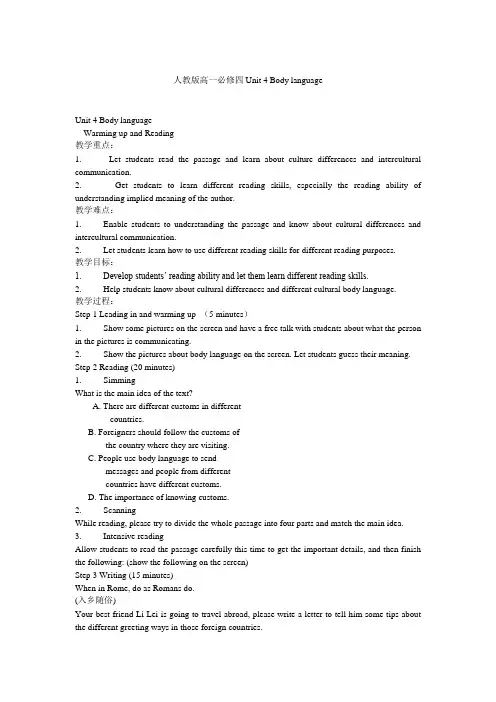
人教版高一必修四Unit 4 Body languageUnit 4 Body language---Warming up and Reading教学重点:1. Let students read the passage and learn about culture differences and intercultural communication.2. Get students to learn different reading skills, especially the reading ability of understanding implied meaning of the author.教学难点:1. Enable students to understanding the passage and know about cultural differences and intercultural communication.2. Let students learn how to use different reading skills for different reading purposes.教学目标:1. Develop students’ reading ability and let them learn different reading skills.2. Help students know about cultural differences and different cultural body language.教学过程:Step 1 Leading in and warming up (5 minutes)1. Show some pictures on the screen and have a free talk with students about what the person in the pictures is communicating.2. Show the pictures about body language on the screen. Let students guess their meaning. Step 2 Reading (20 minutes)1. SimmingWhat is the main idea of the text?A. There are different customs in differentcountries.B. Foreigners should follow the customs ofthe country where they are visiting.C. People use body language to sendmessages and people from differentcountries have different customs.D. The importance of knowing customs.2. ScanningWhile reading, please try to divide the whole passage into four parts and match the main idea.3. Intensive readingAllow students to read the passage carefully this time to get the important details, and then finish the following: (show the following on the screen)Step 3 Writing (15 minutes)When in Rome, do as Romans do.(入乡随俗)Your best friend Li Lei is going to travel abroad, please write a letter to tell him some tips about the different greeting ways in those foreign countries.•Travel around the world↙Jordan←France↖China Britain↘Japan →Colombia↗Dear Li Lei,I’m so excited to hear that you are going to travel abroad. And I'd like to tell you something about the greeting ways.In Japan, people prefer to …People in Colombia like… English people do not usually…The Fr ench custom is … Men from Jordan will often……Wish you a good journey!Yours,…Step 4 Homework1. Finish the letter after class.2. Find more information about body language in different countries.本节课教学反思:本节课的课件设计比较符合我班学生的实际情况,课堂气氛也挺好,学生比较积极活跃。
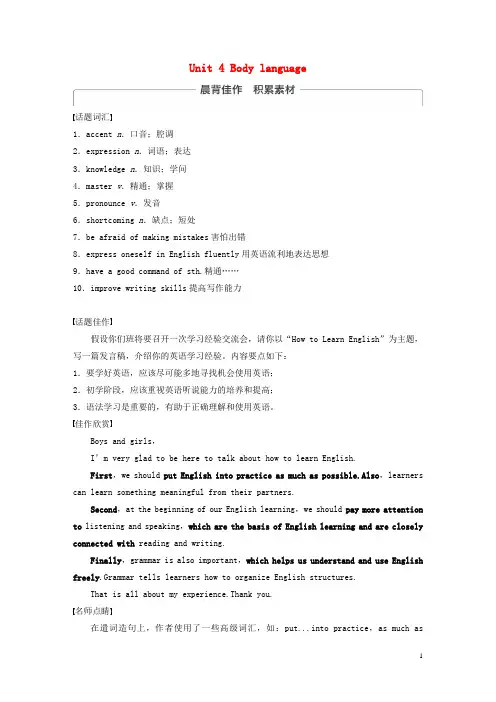
Unit 4 Body language话题词汇1.accent n.口音;腔调2.expression n.词语;表达3.knowledge n.知识;学问4.master v.精通;掌握5.pronounce v.发音6.shortcoming n.缺点;短处7.be afraid of making mistakes害怕出错8.express oneself in English fluently用英语流利地表达思想9.have a good command of sth.精通……10.improve writing skills提高写作能力话题佳作假设你们班将要召开一次学习经验交流会,请你以“How to Learn English”为主题,写一篇发言稿,介绍你的英语学习经验。
内容要点如下:1.要学好英语,应该尽可能多地寻找机会使用英语;2.初学阶段,应该重视英语听说能力的培养和提高;3.语法学习是重要的,有助于正确理解和使用英语。
佳作欣赏Boys and girls,I’m very glad to be here to talk about how to learn English.First,we should put English into practice as much as possible.Also,learners can learn something meaningful from their partners.Second,at the beginning of our English learning,we should pay more attention to listening and speaking,which are the basis of English learning and are closely connected with reading and writing.Finally,grammar is also important,which helps us understand and use English freely.Grammar tells learners how to organize English structures.That is all about my experience.Thank you.名师点睛在遣词造句上,作者使用了一些高级词汇,如:put...into practice,as much aspossible,pay more attention to,be closely connected with等和一些高级句式,如:which引导的定语从句、it作形式主语等。
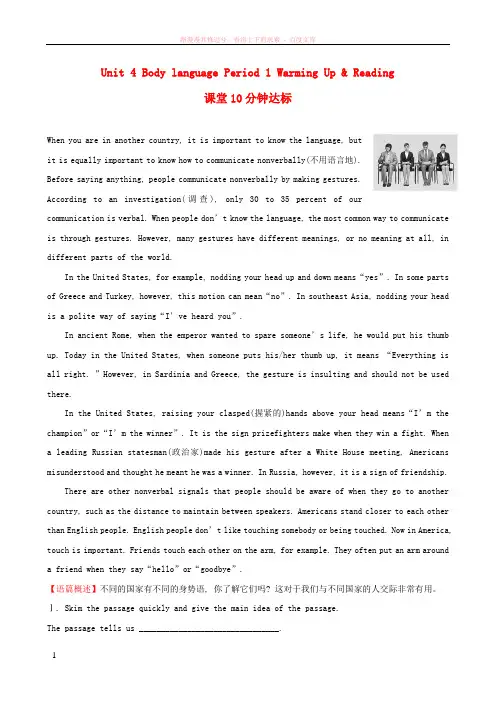
Unit 4 Body language Period 1 Warming Up & Reading课堂10分钟达标When you are in another country, it is important to know the language, butit is equally important to know how to communicate nonverbally(不用语言地).Before saying anything, people communicate nonverbally by making gestures.According to an investigation(调查), only 30 to 35 percent of ourcommunication is verbal. When people don’t know the language, the most common way to communicate is through gestures. However, many gestures have different meanings, or no meaning at all, in different parts of the world.In the United States, for example, nodding your head up and down means“yes”. In some parts of Greece and Turkey, however, this motion can mean“no”. In southeast Asia, nodding your head is a polite way of saying“I’ve heard you”.In ancient Rome, when the emperor wanted to spare someone’s life, he would put his thumb up. Today in the United States, when someone puts his/her thumb up, it means “Everything is all right. ”However, in Sardinia and Greece, the gesture is insulting and should not be used there.In the United States, raising your clasped(握紧的)hands above your head means“I’m the champion”or“I’m the winner”. It is the sign prizefighters make when they win a fight. When a leading Russian statesman(政治家)made his gesture after a White House meeting, Americans misunderstood and thought he meant he was a winner. In Russia, however, it is a sign of friendship.There are other nonverbal signals that people should be aware of when they go to another country, such as the distance to maintain between speakers. Americans stand closer to each other than English people. English people don’t like touching somebody or being touched. Now in America, touch is important. Friends touch each other on the arm, for example. They often put an arm around a friend when they say“hello”or“goodbye”.【语篇概述】不同的国家有不同的身势语, 你了解它们吗? 这对于我们与不同国家的人交际非常有用。

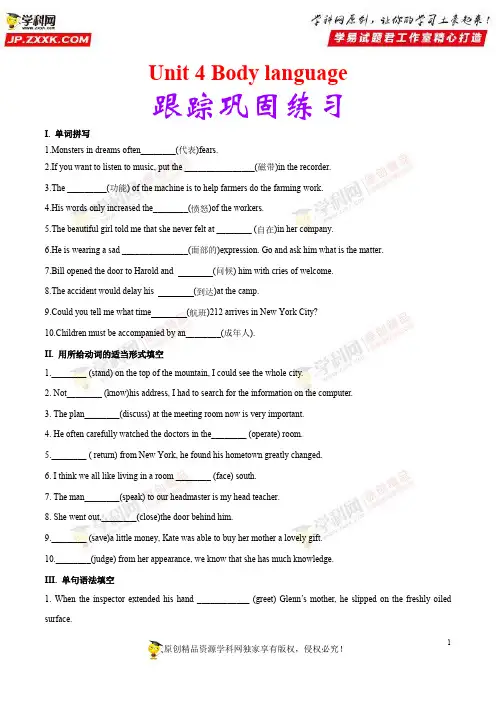
原创精品资源学科网独家享有版权,侵权必究!1 Unit4 Body languageI. 单词拼写1.Monsters in dreams often________(代表)fears.2.If you want to listen to music, put the ________________(磁带)in the recorder.3.The _________(功能) of the machine is to help farmers do the farming work.4.His words only increased the________(愤怒)of the workers.5.The beautiful girl told me that she never felt at ________ (自在)in her company.6.He is wearing a sad _______________(面部的)expression. Go and ask him what is the matter.7.Bill opened the door to Harold and (问候) him with cries of welcome.8.The accident would delay his (到达)at the camp.9.Could you tell me what time (航班)212 arrives in New York City?10.Children must be accompanied by an________(成年人).II. 用所给动词的适当形式填空1.________ (stand) on the top of the mountain, I could see the whole city.2. Not________ (know)his address, I had to search for the information on the computer.3. The plan________(discuss) at the meeting room now is very important.4. He often carefully watched the doctors in the________ (operate) room.5.________ ( return) from New York, he found his hometown greatly changed.6. I think we all like living in a room ________ (face) south.7. The man________(speak) to our headmaster is my head teacher.8. She went out,________(close)the door behind him.9.________ (save)a little money, Kate was able to buy her mother a lovely gift.10.________(judge) from her appearance, we know that she has much knowledge.III. 单句语法填空1. When the inspector extended his hand ____________ (greet) Glenn’s mother , he slipped on the freshly oiled surface.。

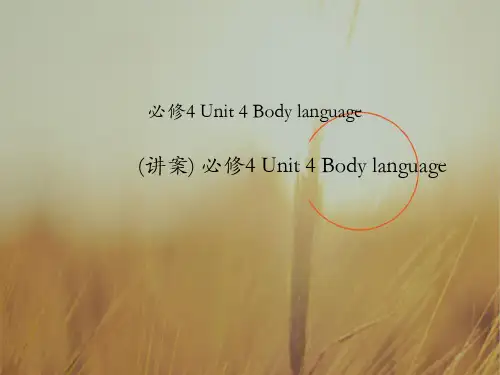

原创精品资源学科网独家享有版权,侵权必究!1Unit 4 Body language体裁 话题词数 难度 建议时间 记叙文在大学期间学习手语的经历266★★★☆☆18分钟While high school does not generally encourage students to explore new aspects of life, college sets the stage for that exploration. I myself went through this 41 process and found something that has changed my 42 at college for the better: I discovered ASL — American Sign Language(美式手语).I never felt an urge to 43 any sign language before. My entire family is hearing, and so are all my friends. The 44 languages were enough in all my interactions(交往). Little did I know that I would discover my 45 for ASL.The 46 began during my first week at college. I watched as the ASL Club 47 their translation of a song. Both the hand movements and the very 48 of communicating without speaking 49 me. What I saw was completely unlike anything I had experienced in the 50 . This newness just left me ___51___ more.After that, feeling the need to 52 further, I decided to drop in on one of ASL club ’s meetings. I only learned how to 53 the alphabet that day. Yet instead of being discouraged by my 54 progress, I was excited. I then made it a point to 55 those meetings and learn all I could.The following term, I 56 an ASL class. The professor was deaf and any talking was 57 . I soon realized that the silence was not unpleasant. 58 , if there had been any talking, it would have 59 us to learn less. Now, I appreciate the silence and the 60 way of communication it opens. 41. A. searching B. planning C. natural D. formal 42. A. progress B. experience C. major D. opinion 43. A. choose B. read C. learn D. create 44. A. officialB. foreignC. bodyD. spoken2017年新课标卷I ·完形填空。


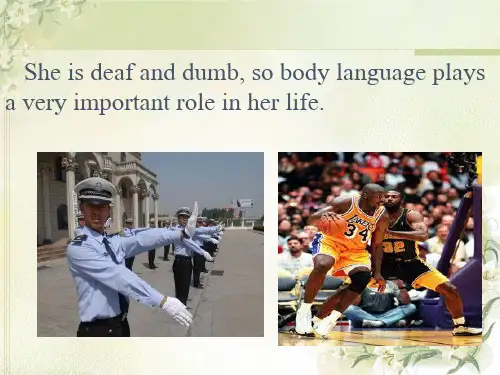
原创精品资源学科网独家享有版权,侵权必究!
1 Unit 4
Body language
(一)如何正确地使用 Body Language
人与人的沟通,并非全靠"言语"在进行。
能够以"非言语",即所谓的Body Language 和其他为手段来表达各种信息,这已是众人所熟知的事物。
根据某项研究显示,70%的沟通可说是以"非言语"为媒介来传达。
因此,脸部表情(facial expressions)、手势(gesture)、姿态(posture)等等,无不隐含着重要的意义。
这些Body Language 与言语、文化具有无法割舍的关系。
或许是难得其间三味吧?很多英语学习者往往由于作法不当以致予人"东施效颦"的不良印象,所以不可不慎。
对于演说中Body Language 的"东施效颦"究竟意指什么呢?心存疑惑的人想来也是不在少数吧。
此处且举其一为例。
在用英语说:"I don ’t know "的时候,有人便作出稍为摊开双手并且耸耸肩膀的Body Language 。
不过这项Body Language 系属相当西洋式的姿势,如果由东方人来做的话,经常带给对方颇不对劲的感觉。
这就有如清末民初洋服刚刚传入中国不久时,当穿起洋服招摇过市的话总要惹人侧目的情形一般。
基本上,对于与自己不搭调的Body Language 还是少用为宜。
如果刻意摆首弄姿,往往引起反效果。
重要的是,不要勉强。
倘若扭捏地模仿"洋人的姿态",不仅徒然予人卑屈的印象,而且容易招致所谓"中国人也和洋人作同样的Body Language 吗?"的奇妙误解。
从事演说之际最好根据自己本身的经验,采取自然形成的"Body Language "为宜。